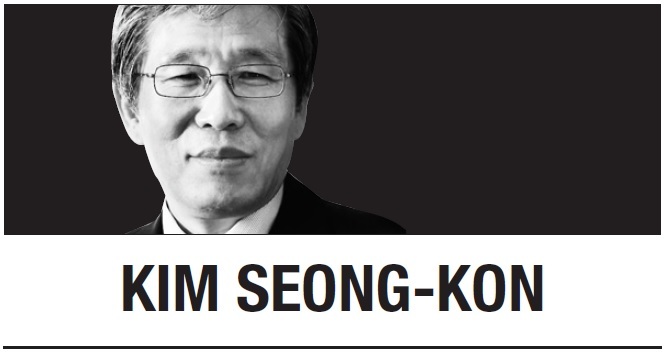[Kim Seong-kon] Understanding South Korea’s Generation MZ
By Kim Seong-konPublished : Feb. 9, 2022 - 05:31

In the eyes of the foreign press, these behaviors of Korea’s younger generations must look weird. However, despite some obvious problems, there is a grain of reason in some of their unusual behaviors. Many Korean men born between the early 1980s and early 2000s cannot find a decent job today, and this harsh reality has left them deeply disillusioned and frustrated. They are angry at their society for not providing them with a happy, stable life.
In that sense, they are the Angry Generation. They are angry because their unemployment status has also forced them to give up vital things in life, such as getting married, having children, owning a home and a myriad of other things. That is why MSN called them “South Korea’s Give-Up Generation.” Korea’s Generation MZ also calls itself the Lost Generation.
Since they cannot afford a home in their lifetimes due to skyrocketing real estate prices, Korea’s Generation MZ finds pleasure elsewhere; they buy a luxury car or merchandise from a famous brand instead. It is no wonder, therefore, that they are willing to stand in a long line early in the morning to purchase luxury items or drive a Mercedes or BMW. Ostensibly, their attitude looks like snobbery, and yet deep down, there is sadness and anger in their desperate, extravagant spending of money.
As for young Korean men’s anti-feminist attitudes, there are reasons behind that, too. They believe that feminism belongs to the older generation, who discriminated against women in a male chauvinist society. Assuming there is no longer real discrimination against women in Korean society, these young men in their 20s think that it is unfair and absurd to give advantages to young women in the name of feminism. Moreover, they are angry because they think women take away all available jobs while men still have to fulfill mandatory military duty for about 1 1/2 years. That is why Korean young men think that it is only fair that Korean women, too, have compulsory military duty, just like men.
Of course, young Korean women do not agree with them. Women argue that there is still discrimination against women at workplaces in salaries and wages. Besides, if a woman becomes pregnant, she feels the invisible pressure to resign, unless she works at a government institution. Korean women are also disappointed in Korean men because they think it is unmanly for them to demand that women serve in the army under the guise of gender equality.
Yet despite these profound gender differences, both men and women of Generation MZ can agree that their government has failed to provide them with happy, secure lives. Young Koreans detest the older politicians’ self-righteousness and the illusion that they represent justice. Young people in Korea are perfectly aware that what the officials call “justice” is arbitrary and thus even dictators can claim that they represent justice, just as Michel Foucault perceived it many years ago. Young Koreans also hate the hypocrisy of the older generation that preaches “fairness,” while they themselves are relishing the sweetness of privileges and unfair advantages.
Korea’s Generation MZ also does not approve of the older generation’s servile attitude toward bully nations. Young people in Korea think that Korean politicians should say “No!” to their neighboring countries when they are overbearing and rude. Young Koreans are confident and proud because they live in an advanced, affluent country.
To a certain extent, Korea’s Generation MZ resembles America’s Soft Generation in the 1960s. American parents who had gone through the Great Depression raised their children dearly as sheltered kids who were consequently vulnerable to violence and adversity. Indeed, while fighting in the Vietnam War, many of them suffered post-traumatic stress disorder.
The Korean parents of Generation MZ, who had gone through the IMF crisis, also raised their children as sheltered kids with overprotection and excessive care. The problem is that if a second Korean War breaks out by any chance, South Korea’s Generation MZ, too, may not be strong enough to overcome PTSD.
Korea’s Generation MZ may look selfish, but they value individual freedom, fairness and transparency. They detest group-oriented, communal impositions and dogmatic political ideologies. Moreover, they are computer-savvy kids who live with social media every day. Recently, a Reuters story contained the headline, “South Korea‘s Gen MZ leads rush into the ‘metaverse.’” They are the future of South Korea. In the upcoming presidential election, Korea’s Generation MZ should choose wisely so they can have a bright future.
Kim Seong-kon
Kim Seong-kon is a professor emeritus of English at Seoul National University and a visiting scholar at Dartmouth College. The views expressed here are his own. -- Ed.


















![[Today’s K-pop] Treasure to publish magazine for debut anniversary](http://res.heraldm.com/phpwas/restmb_idxmake.php?idx=642&simg=/content/image/2024/07/26/20240726050551_0.jpg&u=)